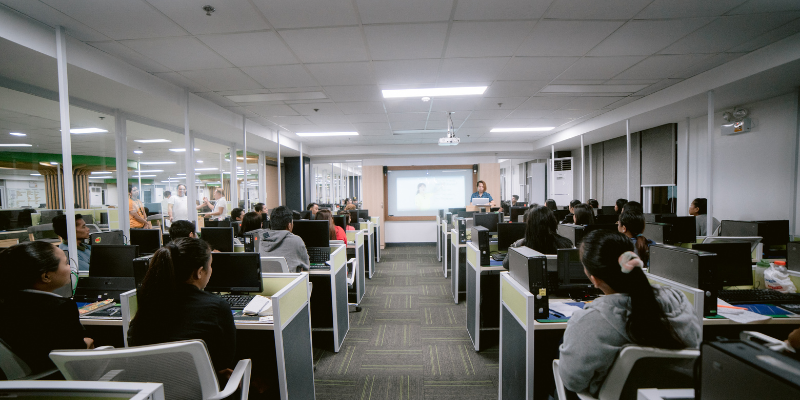Business process outsourcing in the Philippines
The Philippine business process outsourcing has evolved so much since it started. From its humble beginnings in customer service, the country has now earned the title of “BPO capital of the world” and has become one of the most popular outsourcing destinations, next to India.
Not only it helps companies, but also the Philippine economy. BPO has become one of the largest contributions in the economy, employing over 1.3 million workforces and boating an average of 96.3% literacy rate.
GET FREE QUOTE
Send us your requirements and we will get back shortly.
The industry has faced several challenges in the way and has surpassed the pandemic due to its resiliency and readiness. But how did the Philippine BPO rise to its position now? Let’s find out through this article.
A quick overview of the BPO timeline in the Philippines
The BPO industry in the country didn’t spring overnight. The industry credits the first individuals who saw the industry’s potential in the country. Among these individuals are:
- Rainier “Bong” Borja. The former President of the Asian region of Alorica is said to be the most articulate voice of the industry.
- Karen Batungbakal. A popular name in the healthcare outsourcing industry, Karen has been involved in contact center firms even during its early years.
- Former secretary Mar Roxas. Seeing the potential of the BPO industry, he reached out to key leaders to promote foreign investments and gave form to what the industry currently is.
1992
Franz Holz created Accenture’s Global Research Center in the Philippines during this year. It has become the pioneering software development and shared services center in the country at that time. It was also told that he created the first contact center in the country alongside this.

1995
The ease of doing business in the country started when the Philippine Congress passed the Special Economic Zone act. This has lowered area requirements for development and offered tax holidays to foreign investors wishing to build businesses within the country.
This, further, has become the framework of the Philippine Economic Zone Authority or PEZA.
1997
1997 is the year when the Philippines welcomed multinational call center outsourcing when Sykes first opened its doors in the country.
1999
During this year, a new play entered the outsourcing industry. Jim Franke and Derek Holley, former employees of a multinational management consulting company, founded eTelecare Global Solutions.
It has become the first call center in the country, catering to several industries such as consumer electronics, telecommunications, financial services, travel, and media.
2000-2001
The industry started to rise along with the coming of the new millennium. During 2000, the industry has accounted for 0.075% of the country’s GDP growth.
Within the following year, US-based outsourcing center PeopleSupport restructured their company and entered the Philippine atmosphere. It has provided additional 8,400 jobs to Filipinos at that time. In the same year, seven founding members in the country established the Contact Center Association of the Philippines (CCAP)
Two years later, in 2003, one of the biggest players in outsourcing, Convergys, opened up two call centers in the Philippines as a part of the company’s global expansion.
Get 2021 Outsourcing Guide
Find out how SixEleven can help you with outsourcing
Then, in 2004, Former Trade Secretary Mar Roxas launched the “Make IT Philippines” campaign, which brought massive foreign investments in the country and created jobs for Filipino IT professionals.

2005-2006
The BPO industry continues to see its growth during the first half of the current decade. It gained 3% of the global outsourcing market, which translated to 2.4% of the country’s current GDP.
Also, in 2005, SixEleven Global Teleservices was founded. The company became one of the first Filipino-owned solutions-oriented contact centers in the country.
Then, in the following year, ePLDT Ventus (now SPI CRM) has become the forefront of the industry.
2011-2013
The 2010s have become the golden years of the BPO industry in the country. In 2010, the Philippines surpassed India as the leader in BPO industry, which led the country to earn the title as the “BPO capital of the world”.
The next three years (2011-2013) marked the huge increase of growth in the industry. It increased its revenue from $11 billion in 2011 to $15.5 billion in 2013. It has also created 900,000 full-time jobs to Filipinos by the same year.
2018-2019
Decades since outsourcing started in the Philippines, the country has ranked second in the Tholons Top 50 Digital Nations while Manila reclaimed the second spot in Top 100 Super Cities.
According to CCAP, it has also contributed to around 16-18% of total outsourced services globally. The organization has cited data from Texas-based Everest Group. What’s more, the World Trade Organization took notice of the industry, including it in their 2019 report entitled “The Future of Services Trade”.
With the continuous rise of the industry in the country, BPO has predicted to increase its market size even more in the next five years.
2020
The BPO industry was not an exception to the industries that struggled during the pandemic. During the first phases of lockdowns, outsourcing companies has set flexible work arrangements for their employees. For most of them, this is the first time their teams had work-from-home (WFH) arrangements, which brought struggles and work challenges.
But despite this, most companies have adjusted to the new setup and their demand increased. This is due to the rising number of businesses looking to save costs and continue their operations more flexibly.

This caused the industry to increase gradually and be a viable option for businesses, especially in the new normal.
GET FREE QUOTE
Send us your requirements and we will get back shortly.
The future of the Philippine BPO industry
Despite the challenges it faced and the threat of automation, the Philippine business process outsourcing industry still continues to increase its market size in the coming years. For 2022 alone, experts predict the Philippine business process outsourcing to cover at least 15% of the global outsourcing market.
Over time, we can expect other developing countries to become rising names in outsourcing, such as Vietnam and Malaysia. Despite this, with continuous government support and improvements in education and work systems, the Philippines will continue to outshine the competition and remain to be the top destination for foreign clients.



